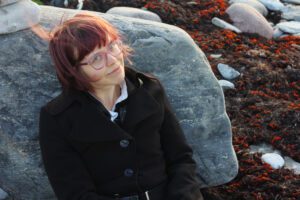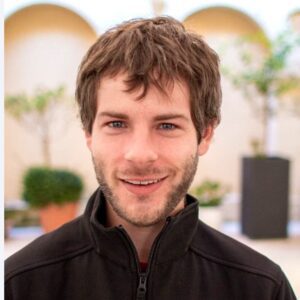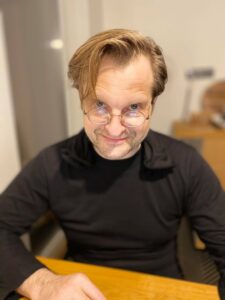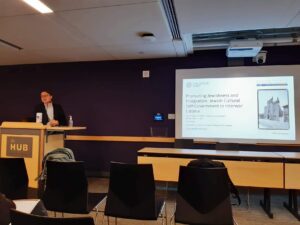The Association for the Advancement of Baltic Studies is pleased share stories and experiences from its 2022 student travel grant recipients who attended the 28th Biennial Conference on Baltic Studies (May 26–29, 2022, Seattle, Washington).
Applications for AABS 2022 student travel grants were evaluated by the AABS Student Travel Grants Committee consisting of AABS Student Representative Kristo Nurmis, AABS Executive Officer-at-Large Guntis Šmidchens, and AABS Advisor to the Board Joseph Ellis. The grants were awarded to 40+ students and early career scholars to support their travel to Seattle in order to attend AABS 2022.
Ieva Balčiūnė
Paper title: “Beating means love: domestic violence and birth control in Soviet Lithuania”
The AABS convention Travel Grant made it possible for me to take part in the conference and provided financial security during the trip. AABS conference was a true academic celebration for the professional community concentrating on the Baltic region. It was an opportunity to present my findings, get acquainted and meet colleagues, discuss relevant questions, share knowledge. It is very important that the event covered a variety of topics and most parts of the sessions were of high academic quality. To me specifically enriching were panels on history and memory, where important problems of history, historiography, as well as research methodology were raised.

Ieva Balčiūnė
Ieva Balčiūnė is a PhD candidate at the Lithuanian Institute of History, the Department of 20th century history. She is a member of “Developing a New Network of Researchers on Contemporary European Motherhood MotherNet“ – Horizon 2020 project. Her academic interests are: abandonment of children, abortion policy, infanticide, and orphanage system in occupied Lithuania.
Merily Salura
Paper title: “Writing Time in Times of Change. Exploring the Temporalities in Peeter Sauter’s novel ‘Indigo'”
I am very grateful to the Association for the Advancement of Baltic Studies for awarding me a travel grant to participate in AABS 2022 conference in Seattle, United States. The generous grant gave me the chance to attend the event in person and meet many dedicated and talented researchers, learn from inspiring presentations and be part of lively discussions. Given the cost of flight tickets, accommodation and the stay in Seattle and given my budget as a doctoral student, my attendance would have been impossible without the travel grant.
At the conference I held a presentation titled “Writing time in Times of Change. Exploring the Temporalities in Peeter Sauter’s Novel “Indigo””. My article explores relationships to time that manifest in two Estonian novels from the transition period in the 1990s. It takes a close look at how two very different types of temporal experiences, as understood through Hans-Georg Gadamer’s aesthetics, are connected and emerge in these works. The two novels serve as case studies for commenting on the literary innovation and fragmentation in the Estonian literary scene in the 1990s.
I received very helpful comments and questions from the audience and made many brilliant new acquaintances. I hope some of these new connections lead to future collaborations. Attending the conference strongly enriched my knowledge concerning other scholars’ works and research areas in Baltic studies. I attended talks about literature, international relations and security, politics, linguistics, visual arts, crafts, art history, nostalgia, communication and media, which will undoubtedly contribute to the quality of my scholarship.
I’d like to express my thanks to the organizers of the conference who made this well-orchestrated, highly engaging interdisciplinary event happen.

Merily Salura
Merily Salura is a PhD student at the Estonian Academy of Arts’ Institute of Art History and Visual Culture. Her Ph.D. dissertation concerns the temporality of creative processes, particularly painting and fiction writing, through the framework of Hans-Georg Gadamer’s aesthetics. With a background in political philosophy, Merily has translated Hannah Arendt’s Origins of Totalitarianism into Estonian as a part of the Avatud Eesti Raamat series (forthcoming), supported by the Estonian Cultural Endowment. She is currently compiling a collection of Peeter Sauter’s prose poetry.
Kevin Axe
Paper title: “Before the “Miracle”: Estonian Experimentation with Hungarian Market Ideas, 1985-1987”
I am thankful for receiving the AABS Travel Grant, as it allowed me to attend the first in-person conference of my career in academia. Although I had attended brief workshops in person, the previous conferences I have attended since starting my PhD in 2020 were in-person. These were demoralizing affairs, with the work of writing a paper and giving a presentation without the payoff of a larger, more curious audience, and networking. By paying for me to attend this year’s conference in Seattle, the AABS Travel Grant let me get to know others in my field–a relief from the isolation of studying and working in Berlin, a truly wonderful city, but one with few, if any, other scholars of the Baltic States.
I enjoyed meeting people I had not seen in years (such as Andres Kasekamp, one of my MA advisors), and making new friends, including other PhD students. It is always enjoyable to meet people with common interests, and with one as obscure as Estonian history, it was especially nice to be able to talk about minutiae, or meet others who have interviewed the same political figures. In several days, I will visit Estonia to present at another conference and conduct research, and am looking forward to reunions with some of the people I met in Seattle.
Naturally, being able to present was also a useful experience. Unfortunately, the presenters in my session had quite different topics, which made it harder to get good feedback, as the audience had few, if any, people with my specialty. However, as the presentation was my first in-person event that had more than a few people in attendance in many years, it made for good practice. I will be giving a similar presentation in under a week, and I now know to make the presentation shorter and less redundant, among other changes. When I began speaking, I also found myself nervous to a degree that surprised me, something I will try to account for next time.
The other sessions I attended were thankfully also quite helpful. Their topics were diverse, but fortunately the presentations were generally quite good (and the exceptions at least made me feel less stressed about my own presentation). A few gave me some promising ideas, or made me realize that I should shift my dissertation focus slightly, while the rest generally at least gave me some memorable anecdotes and quotes!

Kevin Axe
Kevin Axe is a PhD candidate at the Free University of Berlin and researcher within Berlin’s “Contestations of the Liberal Script” (SCRIPTS) Cluster of Excellence. His research is focused on the spread of neoliberal economic thought within the (post)socialist world, focusing on how it spread to socialist Estonia from other socialist polities, was localized, then exported before and after Estonia’s return to independence.
Linas Kontrimas
Paper titles: 1. “Developing index of political literacy – what, how and why: theoretical consideration”; 2. “Political messages, power and trust: where does the problem lie? The case of Lithuania”
This year’s Travel Grant I received from AABS gave me a chance to present two presentations at the 28th biennial conference at the University of Washington. Although the panels were different, the presentations are linked by a common theme – politics.
The first subject I discussed with colleagues at the conference is political literacy. My presentation titled as “Developing index of political literacy – what, how and why: theoretical consideration” raised questions about citizens in democracies and their willingness to take responsibility for state governance.
We can observe (at least in Lithuania) that approximately half of voters ignore elections. This is huge number for free state. Why did this happen? Question and answers are complex and multilayer. I argued that developing an index of political literacy could help us identify problems and find democratic solutions.
Second presentation was more specific – “Political messages, power and trust: where does the problem lie? The case of Lithuania.” We can observe that political actors are strongly affected by media logic. This forces them to create (produce) a large flow of new messages. Every day. Sometimes several times a day.
Such behavior has consequences: it increasingly focuses political messages on short-term political work rather than on long-term plans. The short-term messages changes quickly, so there is a high probability that they will not be implemented at all.
There is another consequence: voters have also become “dependent” on the rapid change of messages. More posts a day – a stronger and more active politician? Does this just illustrate that quantity outweighs quality? This is a topic that needs to be monitored and discussed at other AABS conferences.

Linas Kontrimas
Linas Kontrimas is a PhD student and researcher at Vytautas Magnus University, Lithuania. He is a former journalist and for two decades was consultant in communication business, specifically in election campaigns.
Ausra Valanciauskiene
Paper title: “Non-equivalent Lexis in Bilingual Online Dictionaries”
The 28th Biennial AABS Conference “Baltic Studies at a Crossroads” (May 27–29, 2022, Seattle, WA) was my fifth AABS conference. When I learned the conference would take place in Seattle, I was extremely excited because I used to teach Lithuanian at the University of Washington Scandinavian Department from 2012 to 2016. This conference was rewarding in both academic and personal sense, as I had an opportunity to visit UW, my home of four years, and meet colleagues and people from Lithuanian community.
I enjoyed the plenary by Aldona Jonaitis about Lithuanian carved wooden shrines and totem poles in the Pacific Northwest Coast. It was fascinating to learn about the differences and similarities of these unique carvings. The examination of connections between Indigenous populations in the Pacific Northwest and the Baltic States was very successful. I also enjoyed the performance of the UW choir, which has enriched the event culturally. Session “Representations of food in literature and life-stories” captured my attention. It was something unexpected but fascinating. I learned that analysis of food in various texts could reveal changes in society and culture and even mark national and individual identity. It was also very useful to learn about the new online database Grambank, which aims to include as many as 3,000 languages, and the UraTyp database and how it has been utilized to analyze the position of the Southern Finnic languages within the Uralic language family and Baltic influences in the southernmost Finnic varieties. A touching presentation was “Do not forget, you are not in Lithuania” dedicated to exile to Siberia. I knew much about this topic, but this audiovisual presentation with a reading of memories from a diary, projection of fine art photographs, and a musical accompaniment delivered a brilliant and immersive look into the author’s experiences growing up in Siberia after deportation in 1941. I knew little about Samuel Bak, a Lithuanian-American painter, writer and Holocaust survivor born in Vilnius. It was intriguing to learn about his book “Painted in Words: a Memoir” and how he reached catharsis after experiencing massive trauma and survivor’s guilt. A very entertaining presentation was about a Lithuanian writer and progressive activist, Zemaite (1845-1921). Presenters had pointed out her current significance and reevaluated her short stories. The session was accompanied by an excerpt from Zemaites’ autobiography impressively read by her great-granddaughter and a theatrical performance of actors from Klaipeda Youth Theater.
With its exciting academic and plenary sessions, exhibits, film screenings and book panels, and receptions, the whole conference was very well organized. It was an excellent opportunity to discuss my research, learn about new research, meet colleagues, and have interesting discussions. It has enriched my academic experience and inspired me for further investigations. I want to thank AABS for a travel grant that enabled me to participate in this fantastic event. Thank you so much.

Ausra Valanciauskiene presenting her research at AABS 2022 in Seattle, Washington
Ausra Valanciauskiene has been teaching Lithuanian as a second language at Vilnius University, Lithuania since 1998. She also was a visiting lecturer at University of Washington, at the department of Scandinavian Studies for four years (2012-2016) where she taught Lithuanian language and culture. Ausra has participated in many international projects related to language teaching and testing, she is co-author of few textbooks. Her scientific interests are language testing, methods of language teaching, bilingual dictionaries.
Timo Aava
Paper title: “Promoting Jewishness and integration. Jewish Cultural Self-Government in Interwar Estonia”
I was delighted to participate in the AABS conference in Seattle in person because it was one of the few big conferences that I could participate on-site. A large part of my doctorate has taken place during the pandemic, and thus the majority of conferences have been digital. AABS conference was a vital opportunity to engage personally with the scholarly community, meet old and new colleagues and friends face-to-face, and discuss academic work.
At the conference, I presented a paper analysing the functioning of Jewish Cultural Self-Government in interwar Estonia. Based on an extensive study of archival sources, it touched upon the topics of political dynamics within the institutions and discussed whether it promoted the separation of Jews. The paper I presented is a part of my broader dissertation project that studies the idea and practice of non-territorial autonomy in Estonia between the two world wars.
In addition to presenting my paper, I listened to numerous panel sessions, both focussing on the topics that I am interested in in my research and many others. By attending these numerous presentations, I learned a lot about my colleagues’ fascinating ongoing research. Furthermore, I participated in the plenaries, coffee breaks and meals, which gave me an excellent opportunity to communicate with colleagues.
I would like to express my sincere gratitude to the AABS for making it possible to participate in the conference by awarding me the Travel Grant. I would also like to thank the conference organisers for organising such a fantastic event under the still rather complicated situation.

Timo Aava presenting his research at AABS 2022 in Seattle, Washington
Timo Aava is a PhD student and junior researcher at the Department of East European History of the University of Vienna, and Junior Fellow at the Vienna Wiesenthal Institute. He is currently working on his dissertation on the idea and practice of non-territorial autonomy in interwar Estonia which is a sub-project of a bigger ERC funded project ‘Non-Territorial Autonomy as Minority Protection in Europe’.
